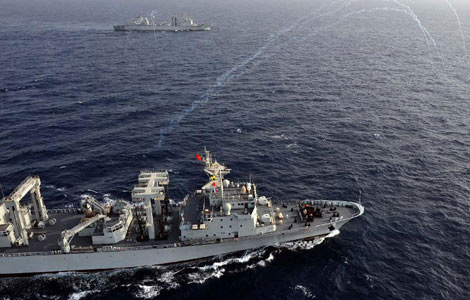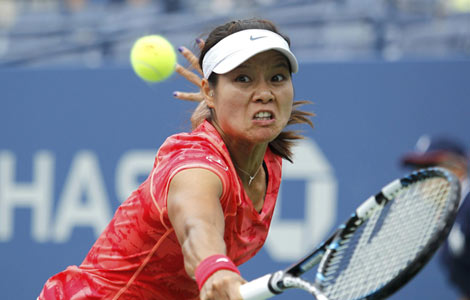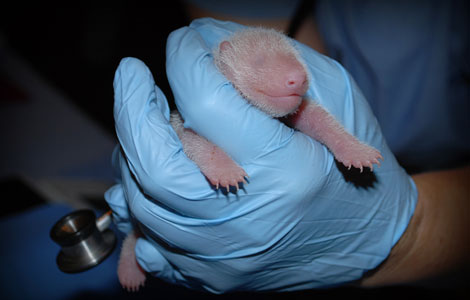Beijing seeks to cement relations with Singapore
Updated: 2013-08-27 01:37
By Zhang Yunbi and Wu Jiao (China Daily)
|
||||||||
Beijing says it hopes Singapore can play a constructive role for peace and stability in the region, as it welcomes the country's prime minister who has been caught in a media storm recently for his China-related remarks.
Welcoming his Singaporean counterpart, Premier Li Keqiang told Prime Minister Lee Hsien Loong that China is determined to seek peaceful development.
But the country's will to safeguard national sovereignty and territorial integrity is unswerving, said Li, referring to territorial disputes with some neighboring countries.
Lee said in May that "China will calculate that any gains from a non-peaceful approach to territorial disputes will have to be weighed against broader implications for its reputation and standing in the world".
His remarks caused a war of words among Internet users following recent Chinese media reports.
Li said in the meeting that China has always called for talks on territorial issues by the parties involved, and any move that may complicate and magnify the situation is "undesirable".
He called on the two countries to cement a political basis for bilateral relations and to gain understanding and support from the two peoples.
Lee said Singapore appreciates China's positive role for regional peace and stability, and it supports relevant parties solving their disputes through peaceful means and negotiations. Singapore will do its part to help encourage cooperation between China and ASEAN, he said.
Analysts said Beijing wants to reduce misunderstanding and cement political trust with Singapore in addition to close economic ties.
Singapore, though small in size, is a leader in the region's development.
"Singapore weighs heavily in China's diplomacy in the region because of its political and economic strength and influence. China hopes Singapore will not make an issue out of the South China Sea disputes," said Jia Duqiang, an expert on South Asia studies at the Chinese Academy of Social Sciences.
Su Hao, a professor at China Foreign Affairs University, said China and Singapore are interdependent.
Singapore has helped China with its economic and administrative management expertise, while China's rapid growth offers investment opportunities for Singapore.
President Xi Jinping also met Lee on Monday and said the biggest challenge facing East Asia is how to cope with the impact brought by the international financial crisis and maintaining a robust momentum of growth.
"We should focus most of our attention on deepening cooperation and common development in the effort to create a peaceful, stable regional situation," Xi said.
Singapore believes China's development means a great chance for Singapore, ASEAN and the region, and Singapore is willing to play a positive role in the process, Lee told Xi.
Beijing has sent a clear signal that the focus of the China-ASEAN relationship lies in economic cooperation rather than the South China Sea issue, which has been highlighted by some members of ASEAN in recent years, said Jia.
Landmark bilateral projects include the China-Singapore Suzhou Industrial Park, Sino-Singapore Tianjin Eco-city and Sino-Singapore Guangzhou Knowledge City.
China became Singapore's third-largest trade partner last year. As the only ASEAN member that has signed a free trade agreement with China, Singapore is a key partner of China within the organization.
Lee told Chinese leaders that Singapore is willing to tap into the full potential of economic cooperation, adding that it will focus on sustainable development and economic transformation.
Lee also highlighted advancing financial cooperation, as clearing services for the Chinese currency are picking up momentum in Singapore.
The Industrial and Commercial Bank of China kicked off its yuan-clearing services in Singapore in May, marking a milestone in Singapore's development as an offshore yuan hub.
Zhang Xiaokang, former Chinese ambassador to Singapore, said Lee's visit is aimed at upgrading the free trade zone in the future .
Lee, on his fourth visit to China, is scheduled to visit Urumqi, Shihezi and Kashgar for an update on local developments in the Xinjiang Uygur autonomous region, according to the prime minister's office. He will also visit Liaoning province.
Song Yinghui, a researcher on Southeast Asian studies at the China Institutes of Contemporary International Relations, said the development of the China-Singapore relationship is producing pragmatic significance against the backdrop of the sluggish world economy.
"Lee's visit to western China symbolizes the expansion of bilateral cooperation from the east part of China to the west," Song said.

 Chinese navy starts escort mission at Gulf of Aden
Chinese navy starts escort mission at Gulf of Aden
 McGrady retires, considers career in China
McGrady retires, considers career in China
 Li Na breezes into US Open second round
Li Na breezes into US Open second round
 China and India set to resume military drills
China and India set to resume military drills
 Dwight Howard, Kai Ko promote fitness in Beijing
Dwight Howard, Kai Ko promote fitness in Beijing
 DC panda cub doing well
DC panda cub doing well
 Muslim Brotherhood leaders, Mubarak face trial
Muslim Brotherhood leaders, Mubarak face trial
 Cliff diving in the city
Cliff diving in the city
Most Viewed
Editor's Picks

|

|

|

|

|

|
Today's Top News
Asian interns in US politics on the rise
Nation must adjust when US tapers QE
Prosecutors seek heavy punishment for Bo Xilai
Pet abuse videos prompt outrage
China joins world anti-tax fraud effort
UN to contact US over spying report
Foreigners nabbed for personal info trafficking
PLA Navy heads for routine drill in W.Pacific
US Weekly

|

|







